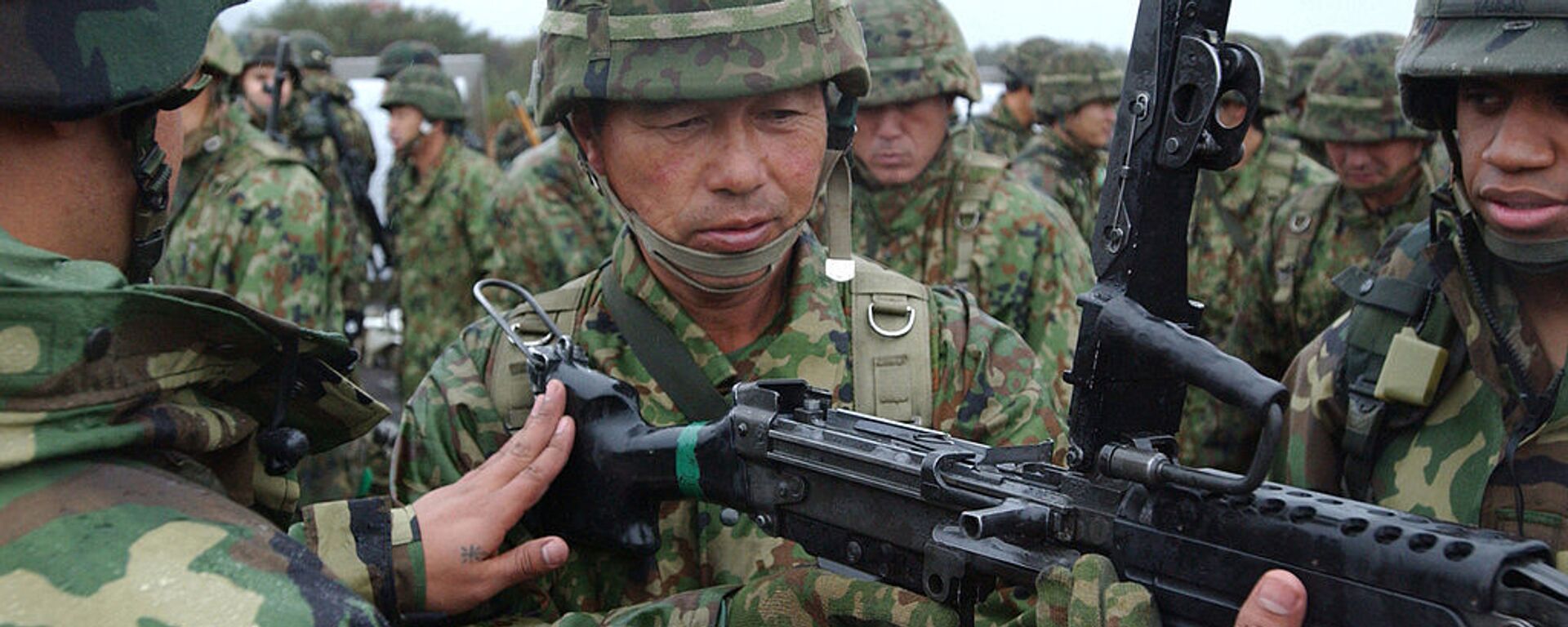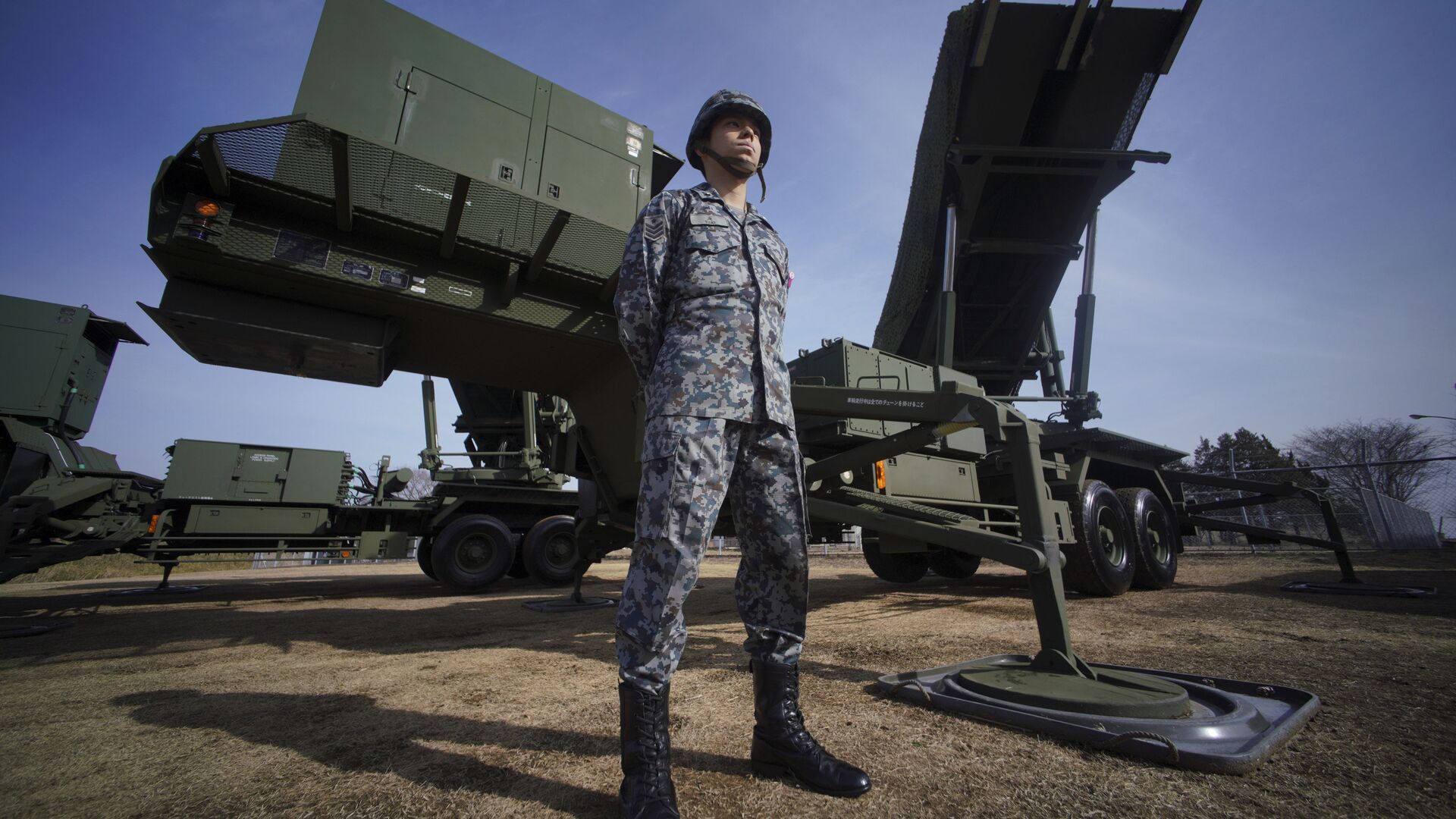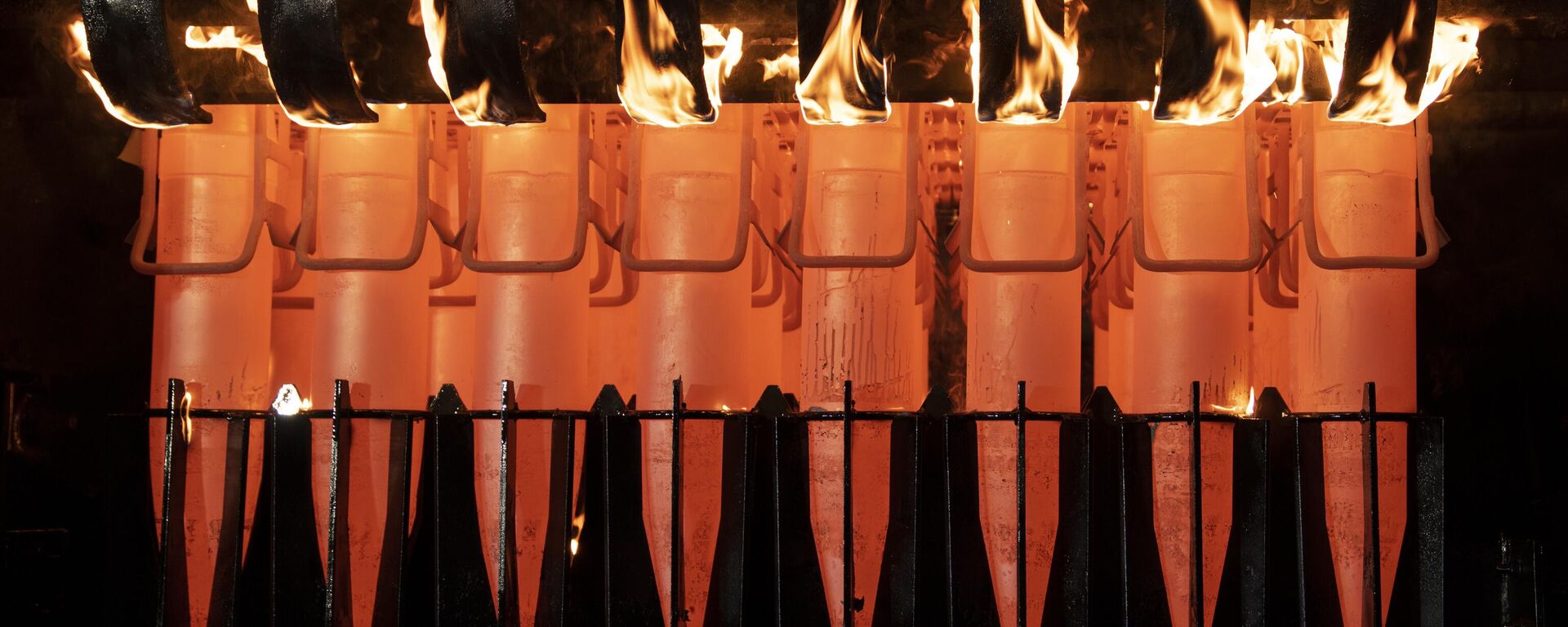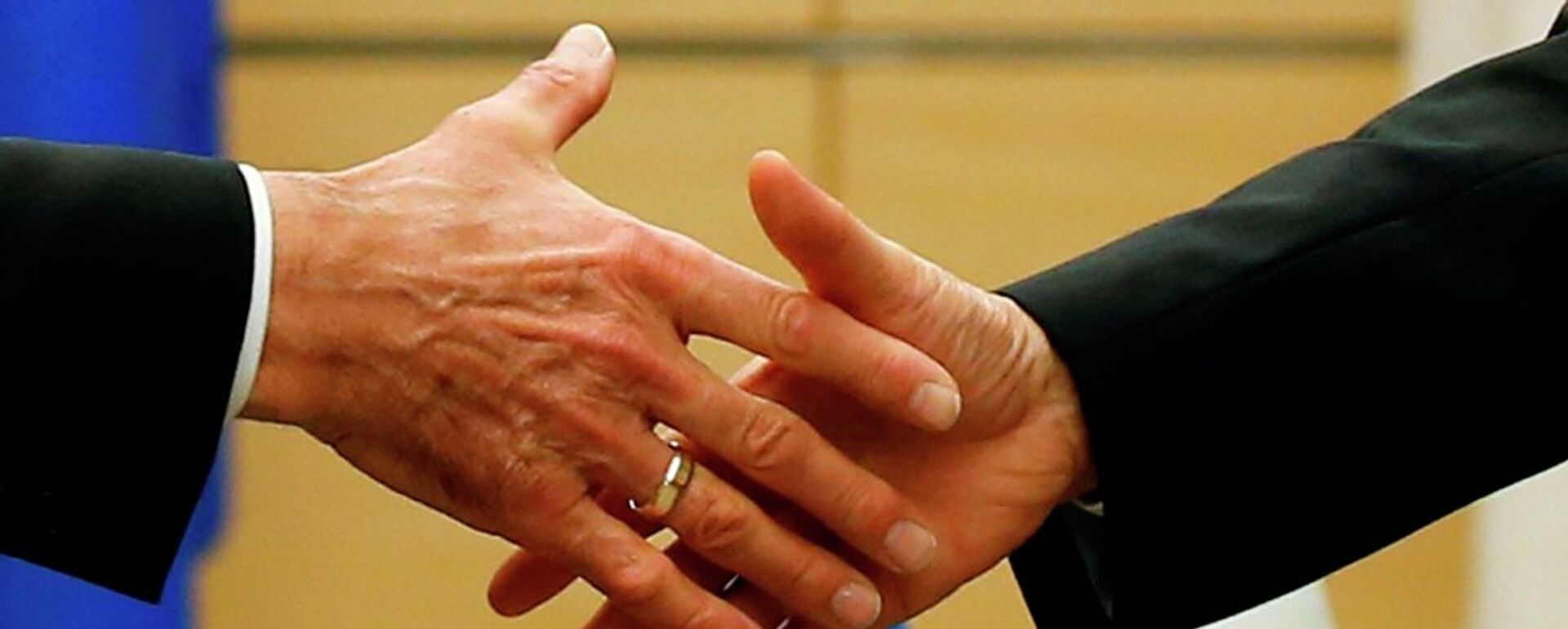https://sputnikglobe.com/20230603/is-us-dragging-japan-into-conflict-with-russia-and-china-1110876946.html
Is US Dragging Japan Into Conflict With Russia and China?
Is US Dragging Japan Into Conflict With Russia and China?
Sputnik International
The Biden administration is reportedly striving to ensure Japan's supplies of TNT for US-made 155mm artillery shells amid Washington's effort to arm the Ukrainian military. What's behind the trend?
2023-06-03T13:27+0000
2023-06-03T13:27+0000
2023-06-03T13:27+0000
analysis
japan
fumio kishida
nato
ukraine
russia
pentagon
tnt
national security strategy
joe biden
https://cdn1.img.sputnikglobe.com/img/07e5/03/12/1082381456_0:150:3000:1838_1920x0_80_0_0_62546c1223159dbd03e8a37b64632651.jpg
"Since coming to power, the Biden administration has been pursuing a very intensive policy of mobilizing and closing ranks with its European allies and allies in Asia," Igor Istomin, lead research fellow at the Center for Advanced American Studies, MGIMO University, told Sputnik. "And in this regard, they are actively trying to engage Asian allies in the strategy of putting pressure on Russia and supporting the transfer of weapons to Ukraine. Therefore, the fact that Japan is involved in this activity is not surprising."Earlier this week, Reuters cited unnamed sources, as saying that, despite Japan's pacifist Constitution, "there is a way for the United States to buy explosives from Japan." The explosive in question is TNT, or trinitrotoluene, which is used in military shells, bombs, and grenades, as well as in industrial uses and underwater blasting. Reportedly, the explosive obtained from Japan is meant to be sent to US army-owned munitions plants that would pack them into 155mm shell cases.Japan's Ministry of Trade, Industry and Economy and Defense Ministry's Acquisition, Technology and Logistics Agency declined to comment on the matter.Still, Istomin believes that the trend is clear. He particularly referred to South Korea's growing involvement in US adventurism. Earlier, purported Pentagon files disclosed that South Korea finds itself between a rock and a hard place after agreeing to sell artillery shells to help the United States replenish its stockpiles. The problem was that Seoul was worried that Washington would divert munitions to the Kiev regime.Indeed, over the last decade, Japan has been gradually revising its pacifist strategy. In December 2022, Japanese Prime Minister Fumio Kishida’s government approved three policy documents – the National Security Strategy (NSS), the National Defense Strategy and the Defense Buildup Program – which envisaged doubling the nation's defense expenditures within the next five years. Furthermore, Japan has bolstered its rapprochement with NATO, with Kishida becoming the first Japanese leader to attend a NATO summit in June 2022. On May 10, Japanese Foreign Minister Yoshimasa Hayashi stated that Tokyo is in talks to open a NATO liaison office which would be the first of its kind in Asia.At the same time, Japan's involvement couldn't currently upset the established balance of power both in Europe and in Asia, according to David T. Pyne, a former US Army HQ staff officer.Pyne told Sputnik that Ukraine has no chance to win no matter how many weapons Washington sends it, because "Russia is so much more powerful militarily" than Ukraine is and "the West is unwilling to send any troops to push Russian forces out" of the territories newly incorporated into the Russian Federation.At the same time, the former Pentagon officer believes that Tokyo has no appetite for directly clashing with China, either.
https://sputnikglobe.com/20230112/us-japan-military-buildup-in-asia-pacific-shatters-regional-stability-scholars-warn-1106260516.html
https://sputnikglobe.com/20230428/globalization-ukraine-aid-has-drained-us-militarys-ability-to-fight-great-power-war-1109914803.html
https://sputnikglobe.com/20230511/natos-liaison-office-in-japan-part-of-plan-to-destabilize-china-and-russia-1110263884.html
japan
ukraine
russia
china
Sputnik International
feedback@sputniknews.com
+74956456601
MIA „Rossiya Segodnya“
2023
News
en_EN
Sputnik International
feedback@sputniknews.com
+74956456601
MIA „Rossiya Segodnya“
Sputnik International
feedback@sputniknews.com
+74956456601
MIA „Rossiya Segodnya“
japan tnt, japanese tnt supplies to us, us-made 155mm shells, us military aid to ukraine, japan defense budget, japan militarization, asia-pacific, indo-pacific, china, taiwan
japan tnt, japanese tnt supplies to us, us-made 155mm shells, us military aid to ukraine, japan defense budget, japan militarization, asia-pacific, indo-pacific, china, taiwan
Is US Dragging Japan Into Conflict With Russia and China?
The Biden administration is reportedly striving to ensure Japan's supplies of TNT for US-made 155mm artillery shells amid Washington's effort to arm the Ukrainian military. What's behind the trend?
"Since coming to power, the Biden administration has been pursuing a very intensive policy of mobilizing and closing ranks with its European allies and allies in Asia," Igor Istomin, lead research fellow at the Center for Advanced American Studies, MGIMO University, told Sputnik. "And in this regard, they are actively trying to engage Asian allies in the strategy of putting pressure on Russia and supporting the transfer of weapons to Ukraine. Therefore, the fact that Japan is involved in this activity is not surprising."
Earlier this week, Reuters cited unnamed sources, as saying that, despite Japan's pacifist Constitution, "there is a way for the United States to buy explosives from Japan." The explosive in question is TNT, or trinitrotoluene, which is used in military shells, bombs, and grenades, as well as in industrial uses and underwater blasting. Reportedly, the explosive obtained from Japan is meant to be sent to US army-owned munitions plants that would pack them into 155mm shell cases.
Japan's Ministry of Trade, Industry and Economy and Defense Ministry's Acquisition, Technology and Logistics Agency declined to comment on the matter.

12 January 2023, 17:54 GMT
Still, Istomin believes that the trend is clear. He particularly referred to South Korea's growing involvement in US adventurism. Earlier, purported Pentagon files disclosed that South Korea finds itself between a rock and a hard place after agreeing to sell artillery shells to help the United States replenish its stockpiles. The problem was that Seoul was worried that Washington would divert munitions to the Kiev regime.
"We already see that South Korea, despite previous statements that it will not supply weapons to Ukraine, is increasingly assisting NATO and supplying weapons to NATO countries," Istomin said. "And Japan is built into the same logic. Moreover, in many respects, Japan has taken a much closer position to the US in recent years. Therefore, this is part of a fairly long-term trend."
Indeed, over the last decade, Japan has been gradually
revising its pacifist strategy. In December 2022, Japanese Prime Minister Fumio Kishida’s government approved three policy documents – the National Security Strategy (NSS), the National Defense Strategy and the Defense Buildup Program – which envisaged
doubling the nation's defense expenditures within the next five years.
Furthermore, Japan has bolstered its rapprochement with NATO, with Kishida becoming the first Japanese leader to attend a NATO summit in June 2022. On May 10, Japanese Foreign Minister Yoshimasa Hayashi stated that Tokyo is in talks to open
a NATO liaison office which would be the first of its kind in Asia.
"In recent years, the Japanese leadership has been abandoning previous restrictions," said Istomin. "Therefore, in this case, when it comes to the transfer of some shells or, in this case, TNT for shells, this fits into the wider policy of both Japan to deepen the alliance with the United States, and the US policy to link the Asia-Pacific and European theater in its global strategy."
At the same time, Japan's involvement couldn't currently upset the established balance of power both in Europe and in Asia, according to David T. Pyne, a former US Army HQ staff officer.
Pyne told Sputnik that Ukraine has no chance to win no matter how many weapons Washington sends it, because "Russia is so much more powerful militarily" than Ukraine is and "the West is unwilling to send any troops to push Russian forces out" of the territories newly incorporated into the Russian Federation.
"I don't think any NATO leaders want a direct military confrontation with Russia as that would lead to an unnecessary nuclear war that no one wants and no one benefits from," he stressed. "Everyone is anxious to avoid war with Russia yet foolishly they continue to want to arm Ukraine and prolong the [conflict] unnecessarily resulting in far more death and destruction for the people of Ukraine."
At the same time, the former Pentagon officer believes that Tokyo has no appetite for directly clashing with China, either.
"Japan has no desire to militarize the region against China which is far more powerful. It knows intervening in a Sino-Taiwanese conflict militarily could result in another Hiroshima and Nagasaki," Pyne concluded.





